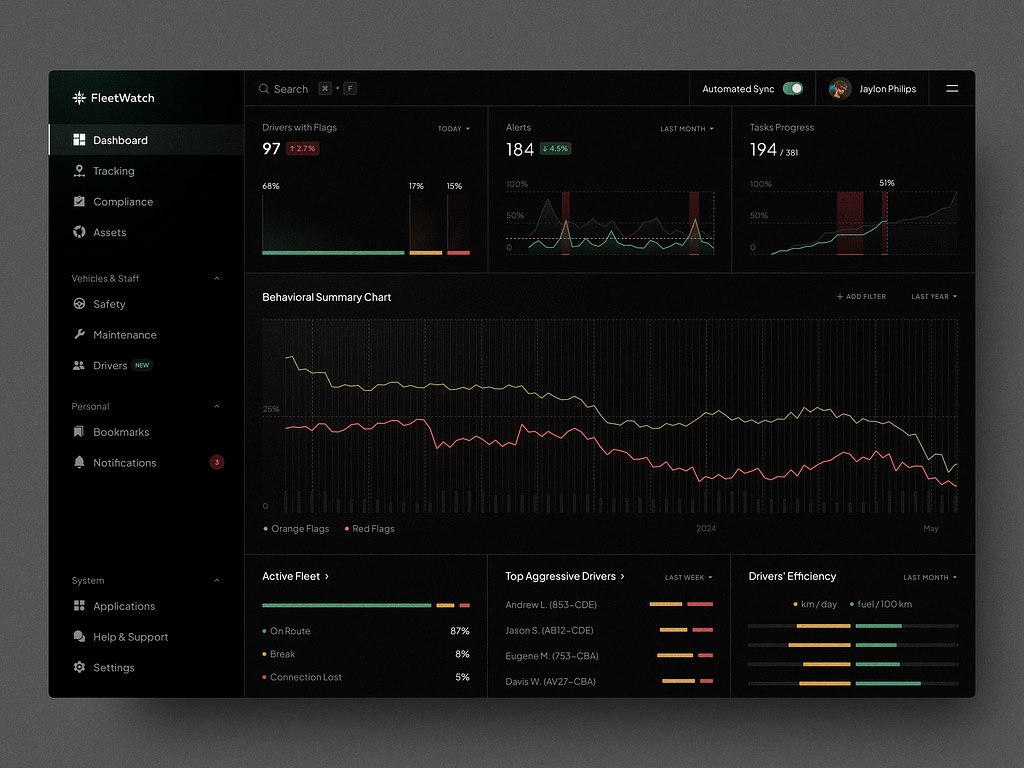It’s the Android vs iOS development debate again. But this time from an app developer’s perspective.
Contents:
This ongoing discussion isn’t just about personal preference. It’s a crucial choice for developers that affects app functionality, user reach, and ultimately, profits. While the general audience might focus on user experience and device aesthetics, tech-savvy developers eye on aspects like platform capabilities, development environment, and market potential. In this blog, we’ll determine which may be the better choice for developing your app.
What is Android?
Android is Google’s open-source mobile operating system. It powers a majority of smartphones worldwide, offering vast customization options and a broad range of devices. This flexibility makes Android appealing to many users and manufacturers. Imagine having the freedom to tweak and tailor your phone just the way you like it. That’s what Android offers.
What is iOS?
Apple’s iOS is a proprietary operating system known for its smooth performance and high security. It’s exclusive to Apple devices like the iPhone, iPad, and iPod Touch. The closed ecosystem of iOS ensures a more controlled and secure environment, which many users and developers appreciate. It gives a polished, cohesive experience by acting as the nervous system for all your Apple gadgets.
Comparing Android Vs iOS App Development
The specified criteria for Android vs iOS development are as follows:
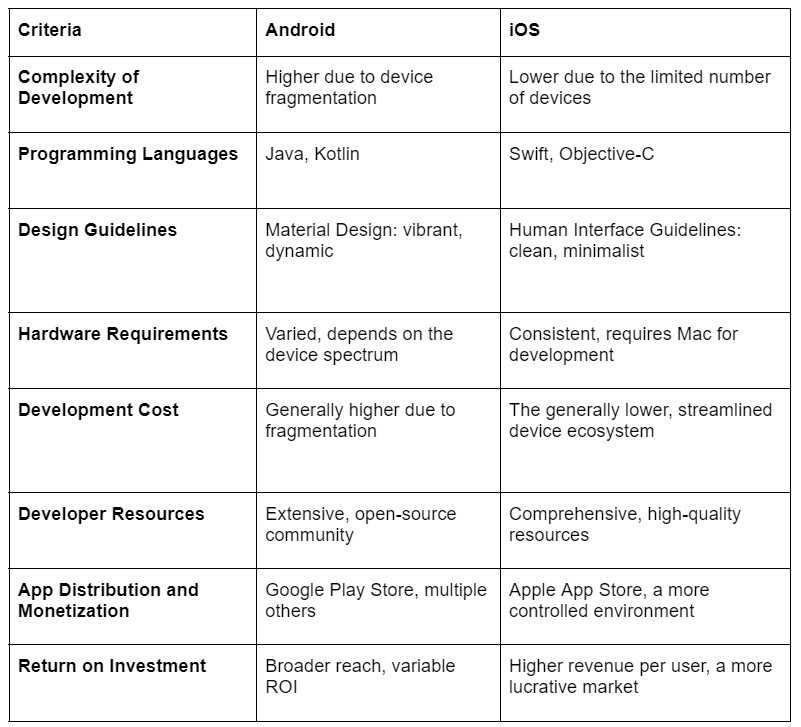
Let’s understand these differences in detail:
Complexity of Development
Developing for Android can be more complex than what non-developers might think. This is because there are so many different devices and screen sizes. It’s like trying to fit one puzzle piece into several different puzzles. This fragmentation requires extensive testing and optimization to ensure the app works well across all devices.
On the other hand, iOS development is more streamlined since it’s made for a limited number of Apple devices. This makes the development process more predictable and consistent. Automated tests within Xcode can efficiently catch errors and ensure your app behaves as expected across all supported Apple devices.
Programming Languages
The majority of Android apps are written in Java or Kotlin. Java has been a long-standing choice for developers. While Kotlin, being fully interoperable with Java, offers modern features and is now the preferred language for Android development.
Objective-C was once the primary language for iOS development. It featured a dynamic runtime and object-oriented capabilities. It is now still relevant for legacy Apple applications. In today’s world, iOS apps use Swift, a language known for its performance, safety, and developer-friendly syntax.
Design Guidelines
Android follows Material Design, a comprehensive guide for visual, motion, and interaction design across platforms and devices. It emphasizes bold colors, grid-based layouts, and responsive animations. The smallest clickable area for Android is 48px.
iOS adheres to Human Interface Guidelines (HIG), which prioritize clarity, deference, and depth. iOS design focuses on simplicity, with extensive use of white space, intuitive navigation, and 44px smallest clickable size.
Hardware Requirements
Android supports devices from a wide range of manufacturers. So, optimization for different hardware configurations becomes a need. Recommended development systems include at least 8GB RAM and 400GB of free disk space.
iOS, exclusive to Apple devices, ensures a consistent user experience and requires a Mac with at least 16GB RAM and 512GB SSD for development using Xcode.
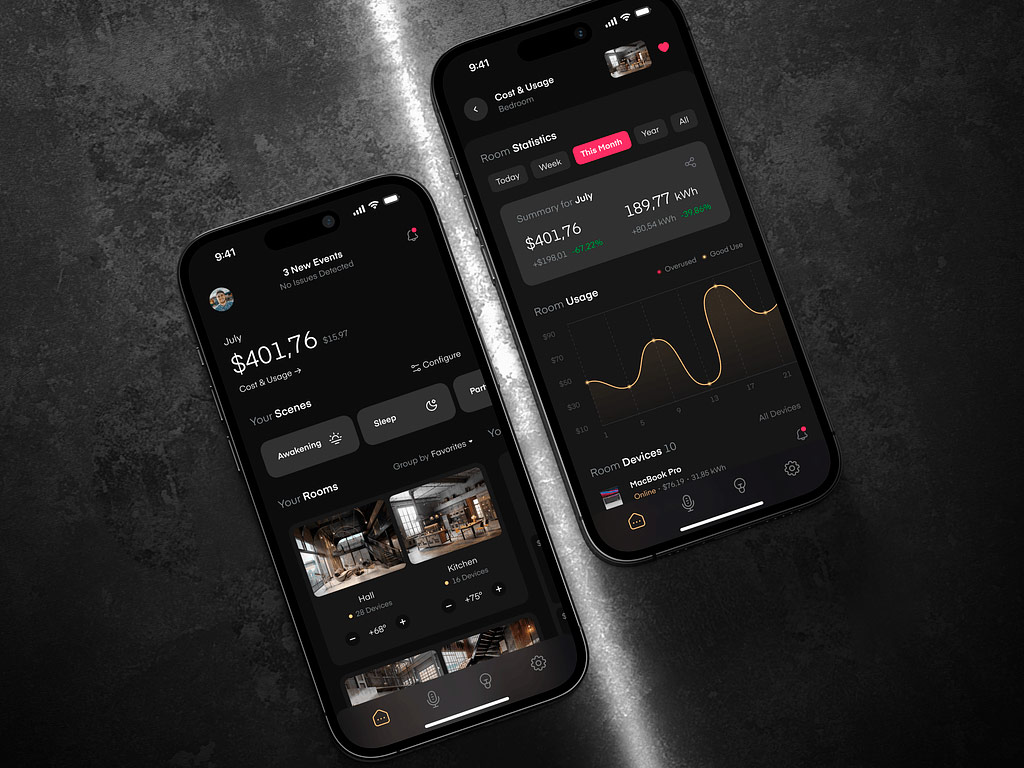
Smart Home Mobile App by Shakuro
Development Cost
Android development can be costlier due to the need to optimize for numerous devices. The diversity in hardware and screen sizes adds to the complexity and testing requirements.
In contrast, iOS development is generally more cost-effective with fewer devices to consider. This leads to a more streamlined development process and lower associated costs.
Developer Resources
Both platforms offer extensive developer resources. Android has a larger and more varied developer community, benefiting from a wealth of shared knowledge and resources.
Apple has robust support and comprehensive documentation. iOS developers highly appreciate this. However, the community is smaller and more focused, due to the proprietary nature of the platform. But this shouldn’t hurt given the support system is strong enough.
App Distribution and Monetization
Android apps are distributed via the Google Play Store, which has a less stringent review process. This allows for quicker and easier app launches. Android apps can be distributed through multiple marketplaces, such as the Amazon App Store, allowing broader reach.
The Apple App Store is the home to all iOS apps. It is known for its rigorous review standards, which can ensure higher quality but also result in longer approval times.
Both platforms support various monetization strategies, including in-app purchases, subscriptions, and ads.
Return on Investment
iOS apps typically generate higher revenue per user. It has attractive monetization despite the smaller market share. In 2023, iOS apps continued to be a highly profitable venture for developers, with consumer spending in the Apple App Store reaching $89.3 billion. This was a 2.8% increase from the previous year.
In 2023, Google Play housed over 2.6 million apps, which collectively saw a staggering 113 billion downloads. They bagged a revenue of $47 billion, illustrating significant growth and activity within the Android ecosystem.
Case Studies
Wyspr
WYSPR developed an iOS application aimed at enhancing connections between brands and Instagram influencers, especially those with smaller audiences. The challenge was to design a platform compliant with App Store regulations while effectively handling intricate data and performance metrics.
Ultimately, WYSPR successfully implemented a robust solution using Ruby on Rails and React. Their team navigated complex technical and regulatory challenges to deliver an efficient and compliant influencer marketing tool. Read more.
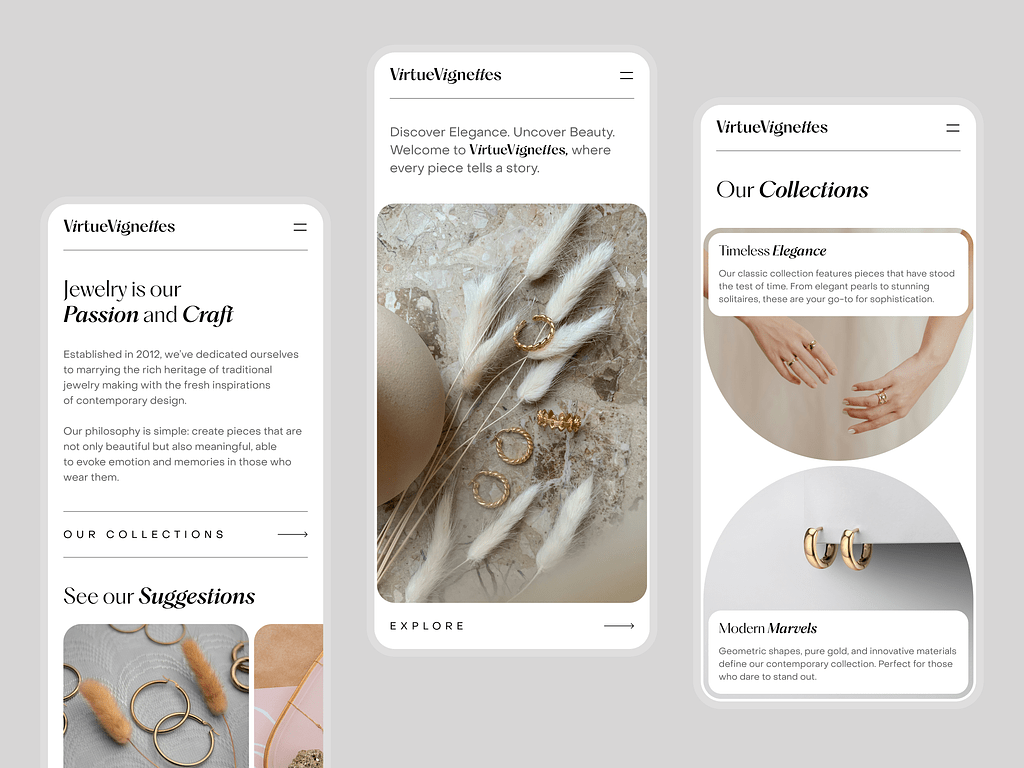
Jewellery E-commerce Mobile App Concept by Shakuro
My Movies
When speaking about Android development vs iOS development, there’s another way of doing things. It is called cross-platform development. The My Movies app project aimed to provide a universal solution for managing movie collections across various devices, from smartphones to smart TVs. The main challenge was to create a cross-platform application that delivers a seamless user experience.
The team at Shakuro managed this by developing native applications for iOS, Android, and other platforms and smart devices like Apple TV. The result was a highly optimized, visually appealing, and functional app that allows users to manage their movie collections effortlessly across all their devices. Read more.
Integrated Development Environment (IDE)
Think of an Integrated Development Environment (IDE) as a high-performance workspace for programmers. An IDE combines the tools needed to write, test, and debug software into one tidy package. It includes a code editor, a compiler or interpreter, and a debugger, all integrated into a single interface.
IDE was developed to help developers streamline their development process, making it easier and faster to turn your ideas into working software. It’s about making the life of a developer a bit more straightforward and a lot more efficient!
Android Studio
Android Studio is a sophisticated tool that lets developers create high-quality Android applications.
It is built on IntelliJ IDEA’s strong code editor and developer tools. But it also includes additional capabilities that improve productivity when developing Android apps. Its primary features include a versatile Gradle-based build system. This is a fast and feature-rich emulator and a unified environment in which you can develop for any Android device. Chrome OS, macOS, Linux, and Windows can all run Android Studio.
Xcode
Xcode is a complete developer toolset for creating apps across all Apple platforms.
With Xcode, you have a rich set of tools for designing user interfaces, building apps, and testing your code. Some of its key features include enhanced code completion, interactive previews, and live animations. Xcode runs only on macOS, and macOS runs only on Apple computers.
So, can you develop iOS apps on Windows? It’s tricky. but not impossible.
Services like MacStadium or Amazon EC2 offer Mac servers. This can let you access remotely from your Windows machine. You can install macOS on a virtual machine using software like VMware or VirtualBox, though this requires a legitimate copy of macOS. Tools like Xamarin or React Native allow you to write code on a Windows machine and compile it for iOS. But you’ll still need access to a Mac for the final steps of app submission.
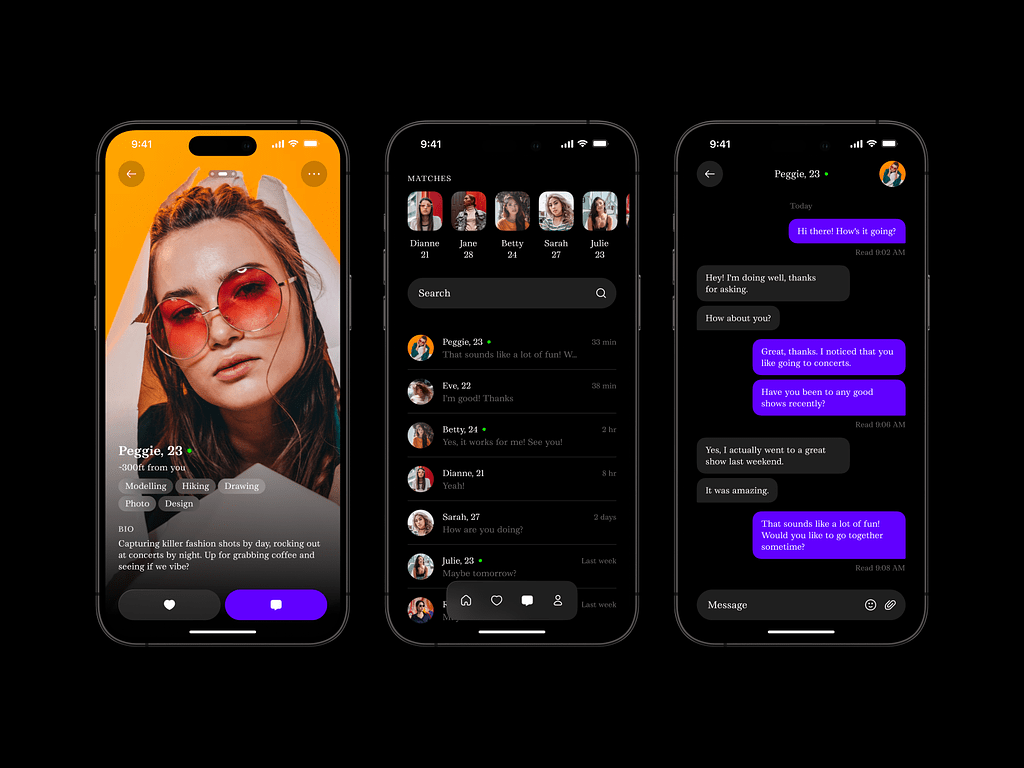
Dating Mobile App by Shakuro
Final Thoughts: iOS and Android App Development – Which is Better?
The choice between Android and iOS depends on your target audience and business goals. If you aim for a broader audience and higher market penetration, Android might be the way to go. We’ve shared a few Android app development secrets in “How to develop an Android app”.
For higher revenue per user and a premium user experience, iOS is a better bet. Both platforms offer unique advantages, and the decision should align with your app’s objectives and target market. Don’t miss our tips and tricks on iOS app development in our “How to develop an iOS app” blog.
Thinking of creating your own app – we can help! Amidst the Android vs iOS development debate, let’s not forget the birth of your application. It’s time for you to bring your app idea to life. Whether you choose Android or iOS, our team at Shakuro of experts can guide you through the development process and help you create a successful mobile application. Get in touch with us today!
